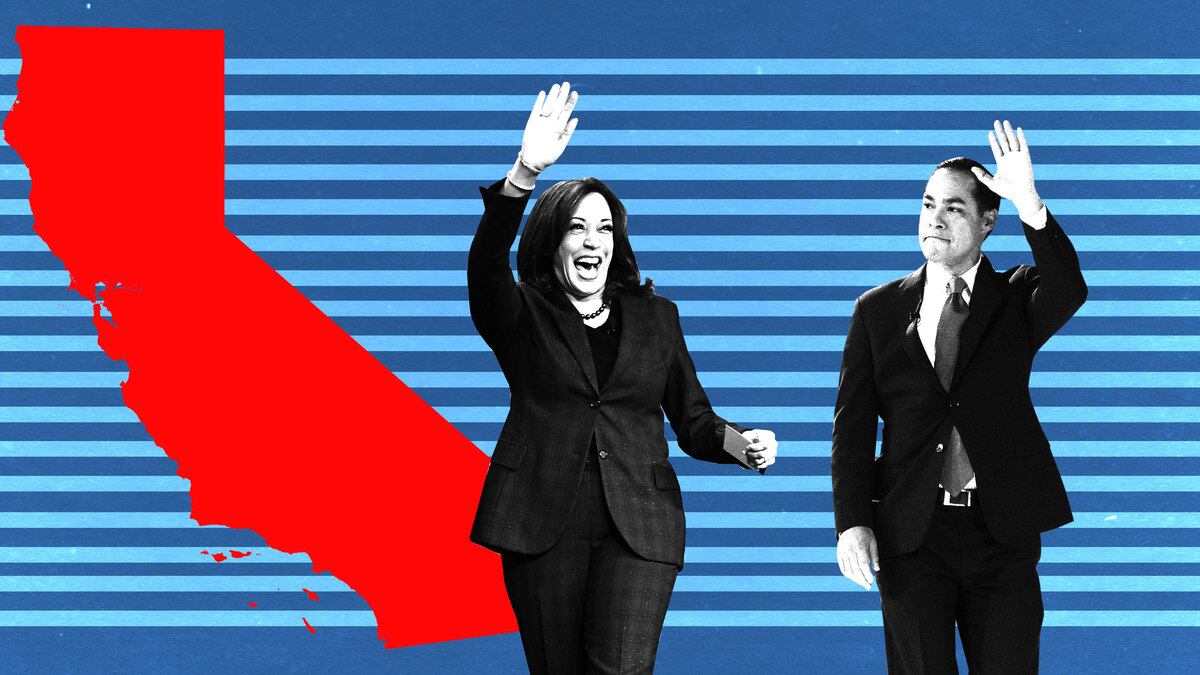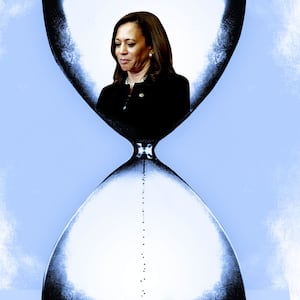With just over 100 days until Super Tuesday, two candidates from massive delegate-rich states could be in danger of squandering any possible home court advantages that they might have held in a few months time.
As nearly a dozen Democratic presidential candidates turn their attention to California for the state party’s convention this weekend, Sen. Kamala Harris (D-CA) and former HUD Secretary Julián Castro risk leaving hauls from California and Texas on the table if they don’t make it to the marquee event in March, according to interviews with Democrats in both states.
The two states, set to vote on March 3, more accurately represent the country’s diverse population than Iowa and New Hampshire, the first two early nominating contests. But each candidate faces an increasingly uncertain path to that day, when the largest number of states in the Democratic primary vote, because they are struggling with plummeting poll numbers, dealing with staff turmoil and departures, and have a top-tier where several contenders have been polling in double digits for months.
ADVERTISEMENT
“The whole game at this point is Super Tuesday,” Colin Strother, a longtime Democratic strategist told The Daily Beast. “If your strategy is not how do you get there, then you have no strategy.”
That dynamic is particularly crucial for Harris and Castro, who have a chance to score the type of delegate bags that could give a lifeline to their faltering campaigns, according to multiple strategists and campaign operatives in Super Tuesday states. In the Democratic primary, California has 495 and Texas 262 delegates up for grabs.
But it will be an uphill climb. And being a native son or daughter only gets a candidate so far.
“If Kamala Harris doesn’t win, place, or show in Iowa or New Hampshire, California voters are not going to throw their votes away by voting for Kamala Harris,” said Garry South, a top political campaign veteran in the state.
Harris has faced campaign turmoil for months. Falling to a distant fourth place in her home state in recent polling averages, behind Sen. Elizabeth Warren (D-MA), former Vice President Joe Biden, and Sen. Bernie Sanders (I-VT), she has just 8 percent, compared to Warren, who has 24.5 percent, Biden, who has 23.5 percent, and Sanders, who has 20.3 percent.
Eyeing the polling downturn, several California Democratic operatives pointed to what they see as the Harris campaign’s strategic mistake of not focusing more on Iowa and New Hampshire as springboards to Super Tuesday. With the competitive nature of the primary, some stressed that as the damage is unfolding in the first two states—letting go of a chunk of staffers in New Hampshire and reshuffling the focus to Iowa—Californians are watching.
“The notion that she’s going to benefit because California’s her home state and everyone’s in love with her and has local pride in her,” South said, “is just insane.”
Harris, along with 10 other presidential candidates, including fellow Californian and mega-donor Tom Steyer, is expected to attend the Democratic Convention in Long Beach, which kicked off on Friday and will have 5,000 party activists rallying in support of party causes. Notably, Biden and Warren are not attending the event, a move that received sharp condemnation from California Democratic Party Chair Rusty Hicks.
“You should reconsider your misguided decision to publicly snub California’s Democrats & Latino Voters across the nation,” Hicks tweeted in reference to the two candidates. “It’s clear you don’t think you need us to win the Primary. But, you *just might* need us in the General. Just sayin’.”
But the stakes there are particularly high for Harris, who was California’s Attorney General and serves as its freshman senator in Congress. With $11.6 million raised in the third fundraising quarter, her campaign is not cash strapped. But it’s still struggling to course correct from resource and staff decisions gone awry, and the early-state calendar is a big part of the problem, Democrats said.
“Kamala’s in the dumps in Iowa, and she’s given a middle finger to New Hampshire,” one longtime Democratic strategist in California who’s worked on past presidential campaigns, said. “They totally misplayed the calculation in the early states.”
The source went on to recall their thinking while watching “strategic miscalculations” being made early on in the first two states. “I kept saying ‘WTF people,’” the source said. “If you don’t kill it in Iowa you’re not going to kill it in California.”
John Shallman, a California-based campaign and media consultant, pointed to the new early voting process in his state’s primary as an additional reason to start early in Iowa. “I told Harris supporters immediately after her announcement that she needed to live in Iowa,” Shallman said. “She must perform well in Iowa specifically because voters in California can begin voting by mail immediately after the Iowa caucuses.”
A similar scenario could play out in Texas, where Castro, the only Latino candidate, faces significant hurdles. For months, he has failed to gain traction in a historically diverse field of contenders. Polling around 1 percent nationally and not faring better in several early states, the campaign announced staff layoffs in New Hampshire and South Carolina and, like Harris, is refocusing its efforts on Iowa.
But on Sunday, he criticized Iowa and New Hampshire’s place in the nominating process, a move that irritated some local leaders.
“Iowa and New Hampshire are wonderful states with wonderful people," he said. "But they’re also not reflective of the diversity of our country, and certainly not reflective of the diversity of the Democratic Party.”
“I can imagine he’s frustrated but blaming his campaign’s challenges on the voters of Iowa and New Hampshire is a bit much,” New Hampshire Democratic Party Chair Raymond Buckley said.
After Castro’s fellow Texan, former Rep. Beto O’Rourke, ended his campaign early in November, the former San Antonio mayor now occupies the home turf entirely to himself. But like Harris in California, he’ll have to overtake several candidates currently polling ahead of him in recent averages: Biden earns 26 percent of support among primary voters in the state, followed Warren, who earns 16.2 percent, and Sanders at 13 percent. Harris follows with 6.2 percent. Castro comes in at just 3 percent.
“If you don’t get legs coming out of Iowa or New Hampshire, I don’t know how you do it,” Keir Murray, a Democratic strategist based in Texas said. “It’s hard for me to see how these lower tier candidates can survive until Super Tuesday.”
And Castro also faces additional hurdles: money and the debates. Raising just 3.5 million in the third quarter, his campaign sent out a plea for $800,000 in an attempt to qualify for the fifth Democratic debate on Wednesday, what he called a “critical moment.” While Castro remains a contender, he did not meet the Democratic National Committee’s threshold to compete, and will not be one of the 10 contenders on stage.
Neither presidential campaign responded to comment by press time.
“I think it has to be the long game for these guys, Kamala and Julián in particular,” Strother said. “It’s going to be a massive challenge for both of them, and it’s going to take a tremendous amount of discipline.”






